高一英语北师大版必修一教学案:Unit 3 Section 4 含答案
(2019新教材)北师大版新课标英语必修一讲义:Unit+3+Section+Ⅳ+Language+
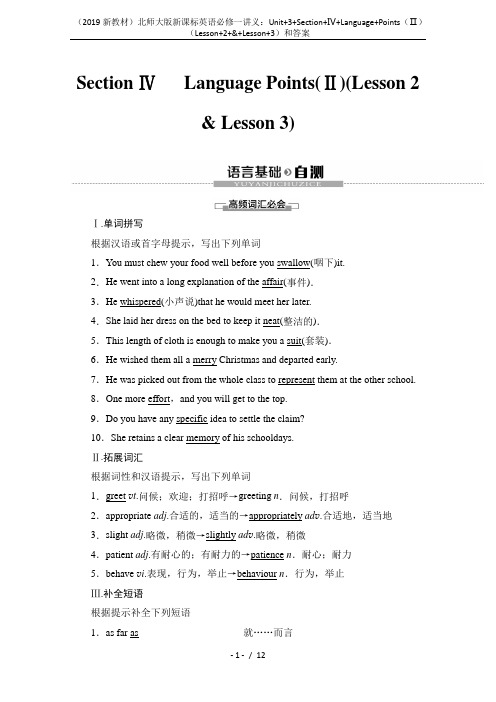
Section ⅣLanguage Points(Ⅱ)(Lesson 2& Lesson 3)Ⅰ.单词拼写根据汉语或首字母提示,写出下列单词1.You must chew your food well before you swallow(咽下)it.2.He went into a long explanation of the affair(事件).3.He whispered(小声说)that he would meet her later.4.She laid her dress on the bed to keep it neat(整洁的).5.This length of cloth is enough to make you a suit(套装).6.He wished them all a merry Christmas and departed early.7.He was picked out from the whole class to represent them at the other school.8.One more effort,and you will get to the top.9.Do you have any specific idea to settle the claim?10.She retains a clear memory of his schooldays.Ⅱ.拓展词汇根据词性和汉语提示,写出下列单词1.greet v t.问候;欢迎;打招呼→greeting n.问候,打招呼2.appropriate adj.合适的,适当的→appropriately ad v.合适地,适当地3.slight adj.略微,稍微→slightly ad v.略微,稍微4.patient adj.有耐心的;有耐力的→patience n.耐心;耐力5.behave v i.表现,行为,举止→behaviour n.行为,举止Ⅲ.补全短语根据提示补全下列短语1.as far as就……而言2.in general 普遍地3.make an effort 努力4.look ahead 向前看;考虑未来5.take turns 轮流6.on the way 在路上7.catch one's eyes 引起某人的注意;遇到某人的目光8.pass away 去世9.no longer 不再10.over and over 再三地;重复地Ⅳ.选词填空选用上述短语的适当形式填空1.I've told you over and over again not to do that.2.The little duck made an effort to climb up the bank.3.As far as I could remember,I did return him the money.4.People in general dislike being criticized.5.Suddenly,a beautiful forest of peach trees,with flowers in full bloom,caught his eyes.[寻规律、巧记忆]in general 普遍地;大体上,一般来说(教材P56)What are the rules for attending parties in general?一般参加聚会的规则是什么?一般来说,每个人都有羞耻心。
最新北师大版高一英语必修一教案第1单元第3课(整理版)

新课标教材北师大版必修模块1李海英、凌蕙、程岚、Unit 1 LifestylesLesson 3 A Volunteer TeacherPeriod 1 Listening and speaking课堂设计设计原则本课时采取了“准确简洁、实用可学”的设计原则,侧重常态教学。
设计重点聚焦在以下两方面:学生活动的活动数量和质量;课堂的起伏和流畅。
模式新课标下的学生主体参与及合作学习目标1. 学生能够抓住语段中的关键词,理解主旨大意。
2. 学生能够了解采访的形式及简单应用。
教学内容1.了解志愿者Wang Shu的信息。
2.介绍采访的形式,结合志愿者话题加以应用。
教学重点1. 在使用中掌握词汇和句型。
2. 主要技能训练:听说写教学难点学生掌握词汇和句型并应用。
语言焦点volunteer, graduate, minus, basin, challenge, decision, support, be excited about; enjoy meeting new challenges;I’d like to do/work as…I feel it’s my duty to …能力猜测、理解、归纳、应用、教法1. 任务驱动,逐层递进2. 集体参与,小组合作,小组展示教学步骤《两位数乘两位数笔算乘法》(不进位)评课稿王玉妹老师十分关注学生已有的知识和经验,精心设计各项活动,从激活学生已有的知识和经验开始,组织学生开展探索、尝试、交流、实践多种活动,全课教学活动中有以下特点:1、复习导入中创造良好的认知准备状态。
一般说来,课堂上学生的学习达成度与学生的认知准备状态直接相关。
两位数乘两位数的笔算与两位数乘一位数在算理上是一致的,所不同的只是一个因数由一位数变成了两位数,由此,王老师设计安排了丰富的复习活动,激活学生已经掌握的口算、笔算的知识和经验。
这里特别突出了笔算,既指定学生报演,又要求每个学生在练习本上算一算。
最新版北师大高一必修1Unit 1精品教案Lesson 3
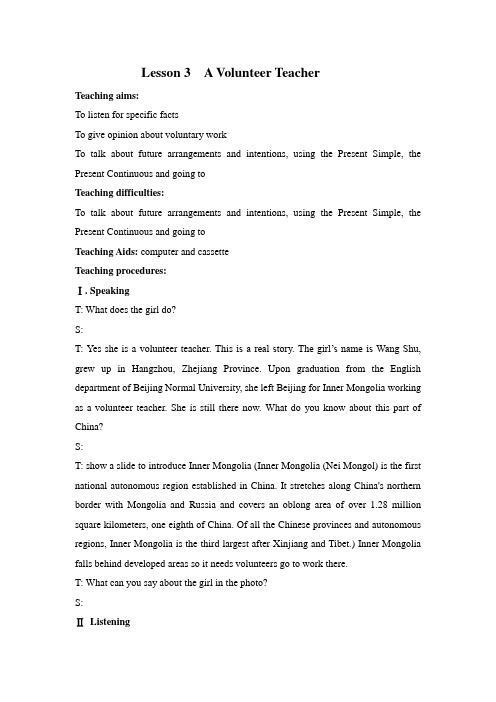
Lesson 3 A Volunteer TeacherTeaching aims:To listen for specific factsTo give opinion about voluntary workTo talk about future arrangements and intentions, using the Present Simple, the Present Continuous and going toTeaching difficulties:To talk about future arrangements and intentions, using the Present Simple, the Present Continuous and going toTeaching Aids: computer and cassetteTeaching procedures:Ⅰ. SpeakingT: What does the girl do?S:T: Yes she is a volunteer teacher. This is a real story. The girl’s name is Wang Shu, grew up in Hangzhou, Zhejiang Province. Upon graduation from the English department of Beijing Normal University, she left Beijing for Inner Mongolia working as a volunteer teacher. She is still there now. What do you know about this part of China?S:T: show a slide to introduce Inner Mongolia (Inner Mongolia (Nei Mongol) is the first national autonomous region established in China. It stretches along China's northern border with Mongolia and Russia and covers an oblong area of over 1.28 million square kilometers, one eighth of China. Of all the Chinese provinces and autonomous regions, Inner Mongolia is the third largest after Xinjiang and Tibet.) Inner Mongolia falls behind developed areas so it needs volunteers go to work there.T:What can you say about the girl in the photo?S:ⅡListeningStudents read the questions and predict the answersT: I think you must be interested in Wang Shu, now listen to the interview, you will learn more about her and answer these questions.Students listen to the tape and check their predictions.Students listen to the tape again and make sure of the answersStudents work in pairs and take turns to retell Wang Shu’s storyⅢVoice your opinionIs it a good idea to do voluntary work? What reasons do people have for doing voluntary work?ⅣVocabularyDo the exercise 5.Students work individually, thinking about the cues and what they are going to do. Students read the sentences, decide which words to use, and then complete the sentences.ⅤGrammarDo the exercise 6Listen to the interview again. Pay attention to these sentences from the interview. What verb forms are used to talk about the future?Guide students to draw the following conclusion:present Simplepresent Continuousgoing to + infinitivedo consolidate exercise7, 8and 9explain further grammar:Expressing future arrangements and intentions:be going to-- to express an intention to do something.Present Continuous-- to talk about future events that we have already fixed or arranged.Present Simple-- to talk about official events or timetables which we cannot change.be going to do 与be doing 的区别be going to do 表示事先经过考虑过,然后计划好将做某事;迹象将发生某事。
高一英语北师大版必修一教学案:Unit 3 Section 3 含答案

Ⅰ.根据英文释义及首字母提示写出单词1.seriously not jokingly or funnily2.envelope paper cover for a letter3.decoration something pretty that you put onto something else in order to make it more attractive4.swallow to move (food or drink) down the throat from the mouth5.stocking covering for the foot and leg6.appear to start to be seen7.stay to continue to be in a particular place for a period of time without moving awayⅡ.补全短语1.at the bottom of在……底下2.on Christmas Eve 在圣诞前夕3.put up举起,建造4.stay awake醒着5.laugh at嘲笑;讥笑6.put on穿上;增加体重;上演7.carry on继续,坚持8.go to church做礼拜1.My sister, Alison, and I sat down in front of the fire and wrote a letter to Father Christmas telling him about all the presents we wanted.我的姐姐艾莉森和我坐在火炉前给圣诞老人写信,告诉他我们想要的所有礼物。
[句式分析]telling him ...为现在分词短语作伴随状语。
[佳句赏析]他熬到深夜,准备一个演讲。
He stayed up late into the night, preparing for a speach.2.Before we went to bed, we left some wine and biscuits for Father Christmas and then put our stockings at the end of our beds.睡觉前,我们给圣诞老人留了些酒和饼干,然后在床尾放上我们的长筒袜。
北师大版高一(上)英语必修一 Unit 3 Lesson 4

roasted turkey Christmas hat
Pre-reading
Which of the things do you think western people stmas carols, Christmas pudding, Christmas tree, snow, snowmen, Christmas stockings, presents
present
balloons
snowmen
Christmas cards
Christmas cards
Christmas cards
Christmas crackers
Christmas pudding
Christmas tree
Christma s stockings
Christmas candies
Reading Strategies
Multiple-choice questions: 1. Read the question and answers. 2. Try to guess the correct answer. 3. Find the place in the text where you think the answer is. (e.g. question 1 = para.1) 4. Read the text and check your answer. 5. Make sure the other two answers are not possible.
Careful reading
Task 1: In what order did the children do these things? a) open the new year calendar 2 b) put their stockings at the end of the bed 5 c) sing Christmas carols 3 d) write a letter to the Father Christmas 1 e) put up the Christmas tree 4 6 f) go to church g) have Christmas cakes 7
北师大高一必修模块1 Unit1 Lesson3 教案

Lesson 3 A Volunteer TeachersT eaching aims:To listen for specific factsTo give opinion about voluntary workTo talk about future arrangements and intentions, using the Present Simple, the Present Continuous and going toTeaching difficulties:To talk about future arrangements and intentions, using the Present Simple, the Present Continuous and going toTeaching Aids: computer and cassetteTeaching procedures:Ⅰ. SpeakingT: What does the girl do?S:T: Yes she is a volunteer teacher. This is a real story. The girl’s name is Wang Shu, grew up in Hangzhou, Zhejiang Province. Upon graduation from the English department of Beijing Normal University, she left Beijing for Inner Mongolia working as a volunteer teacher. She is still there now. What do you know about this part of China?S:T: show a slide to introduce Inner Mongolia (Inner Mongolia (Nei Mongol) is the first national autonomous region established in China. Itstretches along China's northern border with Mongolia and Russia and covers an oblong area of over 1.28 million square kilometers, one eighth of China. Of all the Chinese provinces and autonomous regions, Inner Mongolia is the third largest after Xinjiang and Tibet.) Inner Mongolia falls behind developed areas so it needs volunteers go to work there.T: What can you say about the girl in the photo?S:ⅡListeningStudents read the questions and predict the answersT: I think you must be interested in Wang Shu, now listen to the interview, you will learn more about her and answer these questions.Students listen to the tape and check their predictions.Students listen to the tape again and make sure of the answersStudents work in pairs and take turns to retell Wang Shu’s storyⅢVoice your opinionIs it a good idea to do voluntary work? What reasons do people have for doing voluntary work?ⅣVocabularyDo the exercise 5.Students work individually, thinking about the cues and what they are going to do.Students read the sentences, decide which words to use, and thencomplete the sentences.ⅤGrammarDo the exercise 6Listen to the interview again. Pay attention to these sentences from the interview. What verb forms are used to talk about the future?Guide students to draw the following conclusion:present Simplepresent Continuousgoing to + infinitivedo consolidate exercise7, 8and 9explain further grammar:Expressing future arrangements and intentions:be going to-- to express an intention to do something.Present Continuous-- to talk about future events that we have already fixed or arranged.Present Simple-- to talk about official events or timetables which we cannot change.be going to do 与be doing 的区别be going to do 表示事先经过考虑过,然后计划好将做某事;迹象将发生某事。
最新精品北师大高一必修1Unit 3教案4 1 Festivals
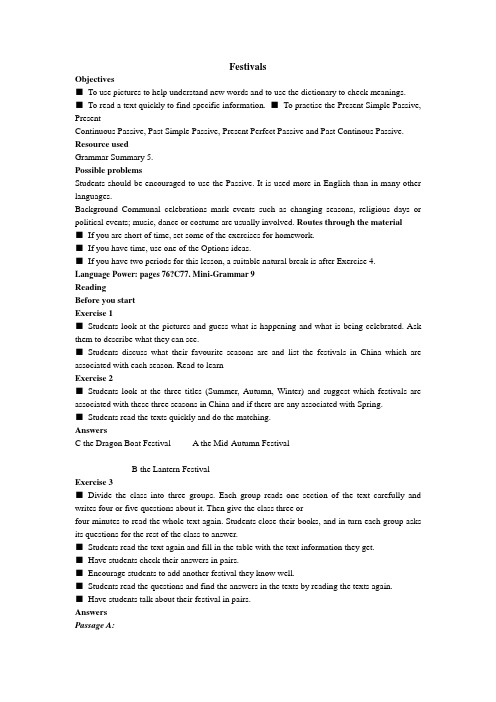
FestivalsObjectives■To use pictures to help understand new words and to use the dictionary to check meanings.■To read a text quickly to find specific information. ■To practise the Present Simple Passive, PresentContinuous Passive, Past Simple Passive, Present Perfect Passive and Past Continous Passive. Resource usedGrammar Summary 5.Possible problemsStudents should be encouraged to use the Passive. It is used more in English than in many other languages.Background Communal celebrations mark events such as changing seasons, religious days or political events; music, dance or costume are usually involved. Routes through the material■If you are short of time, set some of the exercises for homework.■If you have time, use one of the Options ideas.■If you have two periods for this lesson, a suitable natural break is after Exercise 4.Language Power: pages 76?C77. Mini-Grammar 9ReadingBefore you startExercise 1■Students look at the pictures and guess what is happening and what is being celebrated. Ask them to describe what they can see.■Students discuss what their favourite seasons are and list the festivals in China which are associated with each season. Read to learnExercise 2■Students look at the three titles (Summer, Autumn, Winter) and suggest which festivals are associated with these three seasons in China and if there are any associated with Spring.■Students read the texts quickly and do the matching.AnswersC the Dragon Boat Festival A the Mid-Autumn FestivalB the Lantern FestivalExercise 3■Divide the class into three groups. Each group reads one section of the text carefully and writes four or five questions about it. Then give the class three orfour minutes to read the whole text again. Students close their books, and in turn each group asks its questions for the rest of the class to answer.■Students read the text again and fill in the table with the text information they get.■Have students check their answers in pairs.■Encourage students to add another festival they know well.■Students read the questions and find the answers in the texts by reading the texts again.■Have students talk about their festival in pairs.AnswersPassage A:the Mid-Autumn Festival, September or October, moon cakesPassage B:the Lantern Festival, the fifteenth of the first month of the lunar calendar, sweet dumplings Passage C:the Dragon Boat Festival, the fifth day of the fifth month of the lunar calendar, ZongziExercise 4■Students discuss in pairs and tell the class their opinions.GrammarTHE PASSIVE (I)Exercise 5■Students identify that the passive is used when we don’t know or there is no need to say who the “doer” of an action is.■Students then do the exercise, finding the sentences in the text and completing the verbs.■Refer students to Grammar Summary 5 to make sure they understand how to use the Passive correctly.■For further practice, ask students to answer questions about their school (or town), e.g. “When are school examinations held?When are school reports written? Where is football played?When are bells rung? When was this classroom cleaned? When was this school built?”Answers1. are made2. were, organisedExercise 6■ Have students look at the given sentences and ask them what tenses are used in them.■ Encourage students to draw rules for the formation of the passive forms. Ask them to refer Grammar Summary 1,3,4 and 5 on pages 92?C93.Answers1. has been arranged2. is being collected3. was being paintedExercise 7■ Ask students if they have heard of the Water Festival.■ Students read the text to find out about the festival. Then read the text again and complete the verbs.Answers1. is celebrated2. is splashed3. are carried4. are told5. is related6. are washed7. are raced 8. are launched■ Have students close their books and ask them to say what they can remember about the festival.Exercise 8■ Students work in pa irs, changing the sentences into the passive. Answers1. My health is being affected by stress.2. People are being moved out of the houses.3. The mini-helicopter has already been invented by him.4. The forest fire has been put out by them.5. The car was being repaired when I got there.6. The house was being decorated when the accident happenedVocabularyExercise 9■ Students may need to go back to the text to review the words before they start filling in the blanks.Answers1. is lit2. has decorated3. mark4. celebrate5. was included6. was burnt down7 take part in 8. be boiledLanguage in UseExercise 10■ Students work in groups, writing out the questions andadding more of their own questions using the Passive. Tell students they must know the answers to their questions. If you wish, they can finish the questions for homework and use reference sources to check their answers. Each group should have between 10?C15 questions.Answers1. Where is the Mid-Autumn Festival celebrated? (In China)2. Where is “zongzi” eaten? (In China)3. When is the Lantern Festival celebrated? (In China)4. Who was the telephone invented by? (By Alexander Graham Bell)5. Who was Romeo and Juliet written by? (By William Shakespeare)6. Where are BMW cars made? (In Germany)OptionsPractice。
北师大版高一英语必修一unit3_lesson4_Christmasreading教案
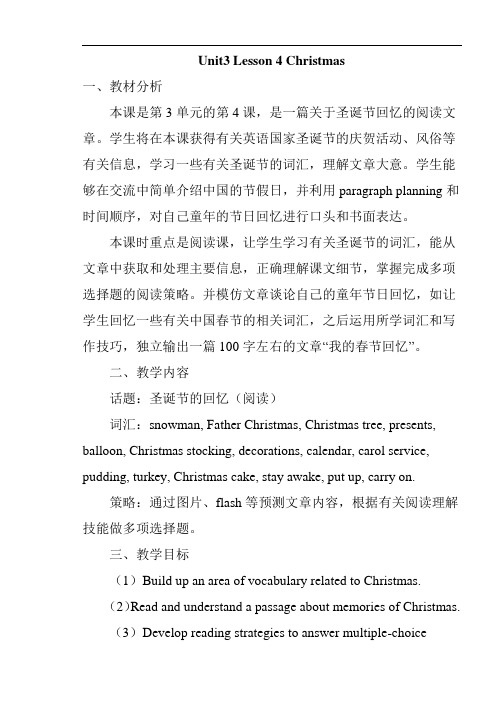
Unit3 Lesson 4 Christmas一、教材分析本课是第3单元的第4课,是一篇关于圣诞节回忆的阅读文章。
学生将在本课获得有关英语国家圣诞节的庆贺活动、风俗等有关信息,学习一些有关圣诞节的词汇,理解文章大意。
学生能够在交流中简单介绍中国的节假日,并利用paragraph planning和时间顺序,对自己童年的节日回忆进行口头和书面表达。
本课时重点是阅读课,让学生学习有关圣诞节的词汇,能从文章中获取和处理主要信息,正确理解课文细节,掌握完成多项选择题的阅读策略。
并模仿文章谈论自己的童年节日回忆,如让学生回忆一些有关中国春节的相关词汇,之后运用所学词汇和写作技巧,独立输出一篇100字左右的文章“我的春节回忆”。
二、教学内容话题:圣诞节的回忆(阅读)词汇:snowman, Father Christmas, Christmas tree, presents, balloon, Christmas stocking, decorations, calendar, carol service, pudding, turkey, Christmas cake, stay awake, put up, carry on.策略:通过图片、flash等预测文章内容,根据有关阅读理解技能做多项选择题。
三、教学目标(1)Build up an area of vocabulary related to Christmas.(2)Read and understand a passage about memories of Christmas.(3)Develop reading strategies to answer multiple-choicequestions.(4)Talk about their childhood memories of an important festival.(5)Know about and respect the different cultures in foreign countries.四、教学重、难点(1)Words and expressions:snowman, Father Christmas, Christmas tree, presents, balloons, Christmas stockings, decorations, calendar, carol service, pudding, turkey, Christmas cake, stay awake, put up, carry on.Sentence patterns:a. We tried to stay awake as long as possible to see Father Christmas… b. After lunch, the adults slept on the sofas in front of the Queen’s speech on television…(2)Get the students to acquire the skill of doing themultiple-choice exercise.(3)Let the students know about and respect the different cultures in foreign countries.五、教学过程Step I Lead-in(Greetings)T: Now let’s watch a short video and please enjoy it.(show the students the video)T: The video is very interes ting, isn’t it?S: ...T: But do you know which festival is the song about?S: …T: And how much do you know about Christmas? Now, let’s see some pictures and learn some new words about it. I’m sure they will be very useful in today’s lesson. So please read the new words after me. Each word three times. Clear?S: …(show the pictures and read the new words)T: Have you remembered all the new words?S: …T: Let’s check and see.[设计说明]图文声像并用,正确引导,由学生熟悉的英语歌曲Jingle bell的动画flash导入,让他们有话可说,然后结合具体形象的图片让学生轻松掌握词汇,在愉快的氛围中积极参与课堂教学,活跃课堂气氛,为进一步理解课文做好准备。
高一英语北师大版必修一教学案:Unit 3 Section 2 含答案
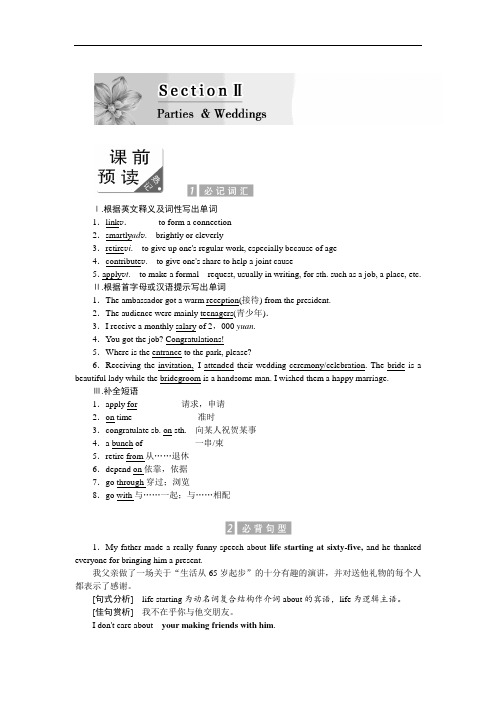
Ⅰ.根据英文释义及词性写出单词1.link v.to form a connection2.smartly ad v. brightly or cleverly3.retire v i. to give up one's regular work, especially because of age4.contribute v. to give one's share to help a joint cause5.apply v t. to make a formal request, usually in writing, for sth. such as a job, a place, etc.Ⅱ.根据首字母或汉语提示写出单词1.The ambassador got a warm reception(接待) from the president.2.The audience were mainly teenagers(青少年).3.I receive a monthly salary of 2,000 yuan.4.You got the job? Congratulations!5.Where is the entrance to the park, please?6.Receiving the invitation,_I attended their wedding ceremony/celebration. The bride is a beautiful lady while the bridegroom is a handsome man. I wished them a happy marriage.Ⅲ.补全短语1.apply for请求,申请2.on time 准时3.congratulate sb. on sth. 向某人祝贺某事4.a bunch of 一串/束5.retire from从……退休6.depend on依靠,依据7.go through穿过;浏览8.go with与……一起;与……相配1.My father made a really funny speech about life starting at sixty-five, and he thanked everyone for bringing him a present.我父亲做了一场关于“生活从65岁起步”的十分有趣的演讲,并对送他礼物的每个人都表示了感谢。
北师大版高中英语选择性必修第一册课后习题 Unit 3 Section Ⅳ
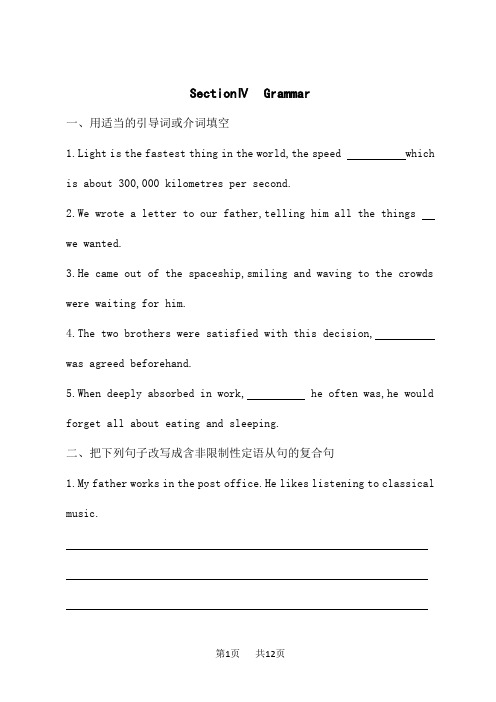
SectionⅣGrammar一、用适当的引导词或介词填空1.Light is the fastest thing in the world,the speed which is about 300,000 kilometres per second.2.We wrote a letter to our father,telling him all the things we wanted.3.He came out of the spaceship,smiling and waving to the crowds were waiting for him.4.The two brothers were satisfied with this decision,was agreed beforehand.5.When deeply absorbed in work, he often was,he would forget all about eating and sleeping.二、把下列句子改写成含非限制性定语从句的复合句1.My father works in the post office.He likes listening to classical music.2.About 2,000 people worked on the project.Many of them were Europeans.3.In his office there are nine clerks.The youngest of them is Mr Wang.4.I wish to thank Professor Smith.Without his help I would never pass the exam.三、阅读理解ABy the end of the century,if not sooner,the world’s oceans will be bluer and greener thanks to a warming climate,according to a new study.At the heart of the phenomenon lie tiny marine microorganisms(海洋微生物) called phytoplankton.Because of the way light reflects off the organisms,these phytoplankton create colourful patterns at the ocean surface.Ocean colour varies from green to blue,depending on the type and concentration of phytoplankton.Climate change will fuel the growth of phytoplankton in some areas,while reducing it in other spots,leading to changes in the ocean’s appearance.Phytoplankton live at the ocean surface,where they pull carbon dioxide(二氧化碳)into the ocean while giving off os die,they bury carbon in the deep ocean,an important process that helps to regulate the global climate.But phytoplankton are vulnerable to the ocean’s warming trend.Warming changes key characteristics of the ocean and can affect phytoplankton growth,since they need not only sunlight and carbon dioxide to grow, but also nutrients.Stephanie Dutkiewicz,a scientist in MIT’s Centre for Global Change Science,built a climate model that projects changes to the oceans throughout the century.In a world that warms up by 3℃,it found that multiple changes to the colour of the oceans would occur.The model projects that currently blue areas with little phytoplankton could become even bluer.But in some waters,such as those of the Arctic,warming will make conditions riper for phytoplankton,and these areas will turn greener.“Not onl y are the quantities of phytoplankton in the ocean changing,”she said,“but the type of phytoplankton is changing.”And why does that matter?Phytoplankton are the base of the food web.If certain kinds begin to disappear from the ocean,Dutkiewicz said,“it wi ll change the type of fish that will be able to survive.”Those kinds of changes could affect the food chain.Whatever colour changes the ocean eing decades will probably be too gradual and unnoticeable,but they could mean significant changes.“It’ll be a wh ile before we can statistically show that the changes are happening because of climate change,”Dutkiewicz said,“but the change in the colour of the ocean will be one of the early warning signals that we really have changed our planet.”1.What are the first two paragraphs mainly about?A.The various patterns at the ocean surface.B.The cause of the changes in ocean colour.C.The way light reflects off marine organisms.D.The efforts to fuel the growth of phytoplankton.2.What does the underlined word “vulnerable” in paragraph 3 probably mean?A.Sensitive.B.Beneficial.C.Significant.D.Unnoticeable.3.What can we learn from the passage?A.Phytoplankton play a declining role in the marine ecosystem.B.Dutkiewicz’s model aims to project phytoplankton changes.C.Phytoplankton have been used to control global climate.D.Oceans with more phytoplankton may appear greener.4.What is the main purpose of the passage?A.To assess the consequences of ocean colour changes.B.To analyse the composition of the ocean food chain.C.To eate change on oceans.D.To introduce a new method of studying phytoplankton.BAs energy costs rise across Europe,some people are taking an opportunity to head off to warmer climates in order to cut down on bills.Greece is one of a number of countries trying to draw visitors in for the winter—with a $20 million advertising campaign.Famous for its sun,golden beaches and medieval city,the island of Rhodes in the south Aegean Sea is a magnet(有吸引力的地方) fornorthern Europeans.More than three million flock to the island every summer,but some also come in the winter.In order to capitalise on the energy crisis,the Greek government launched a series of winter tourism campaigns aimed at attracting European visitors seeking an alternative to the bitter cold and high energy bills.Places like Santorini,Crete and Rhodes were high on the list,as temperatures there remain in the high teens.However,the campaign to advertise Greece abroad hasn’t attracted as many visitors as epaign from the ministry is in the right direction—I think they’re doing things right,”says Dionissis Tsiligiris,tourism marketing director for the Rodos Palace hotel and convention centre in Rhodes.“But when it comes to winter tourism,Spain will always be the firstchoice,”Tsiligiris continu es.Hotels and tour operators there just have more epeting for winter tourism is very difficult,as it’s a smaller market.While it’s true that fewer people travel abroad than in the summer,entering the winter market could seem quite easy when you have the two key ingredients—almost guaranteed sun andwell-established tourist facilities.But what’s making it difficult,according to Ashley Quint,senior holiday designer at a UK travel agency,is the message the government is sending.“Tourist boards and local governments can over-complicate things sometimes and the message doesn’t necessarily come across.In this case,there needs to be a simple and clear message.In addition,broadening it out a little bit may be better,because we see very little here.”It seems that making Greece a winter destination for travellers to enjoy and save might need more than just the attraction of warmer weather.5.Why do some Europeans go to warmer countries for winter?A.To avoid energy expense.B.To decrease the heating fee.C.To enjoy sunshine and beaches.D.To eainlyresultsinthedisappointingresultofGreece’scampaign?A.Ministry’spoormarketing.B.Operator’slimitedemonpreference.ernment’sinappropriatepolicies.7.WhatshouldGreece’scampaignfocusonaccordingtoAshleyQuint?A.Sendingthemessageglobally.B.Gettingideaseasilyunderstood.C.Beatingthepotentialcompetitors.D.Advertisingkeytouristresources.8.Whatmightbethebesttitleforthepassage?A.GreeceReadytoTakeWinterTouristMarketB.GreeceConfidenttoWintheTourismCampaignC.GreeceEagertoDrawWinterTouriststotheSunD.GreeceDeterminedtoBeaWinterTouristDestination答案:一、1.of 2.that 3.who/that 4.which 5.as二、1.My father,who likes listening to classical music,works in the post office.2.About 2,000 people,many of whom were Europeans,worked on the project.3.In his office there are nine clerks,the youngest of whom is Mr Wang.4.I wish to thank Professor Smith,without whose help I would never pass the exam.三、1.B 主旨大意题。
北师大版高中英语选择性必修第一册课后习题 Unit 3 Section Ⅰ
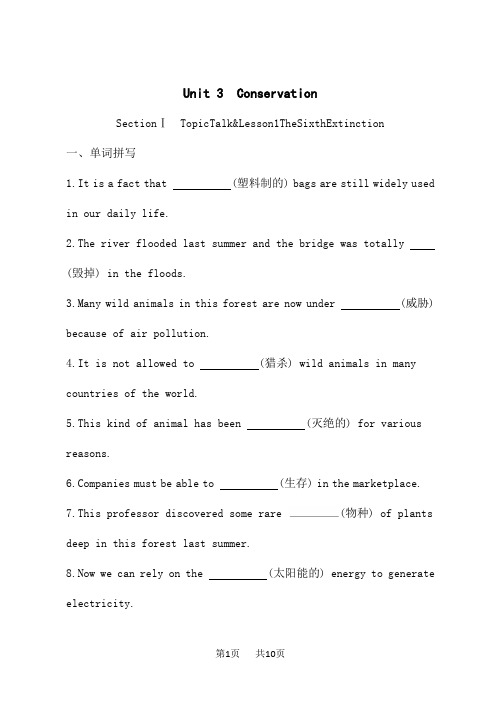
Unit 3 ConservationSectionⅠTopicTalk&Lesson1TheSixthExtinction一、单词拼写1.It is a fact that (塑料制的) bags are still widely used in our daily life.2.The river flooded last summer and the bridge was totally (毁掉) in the floods.3.Many wild animals in this forest are now under (威胁) because of air pollution.4.It is not allowed to (猎杀) wild animals in many countries of the world.5.This kind of animal has been (灭绝的) for various reasons.panies must be able to (生存) in the marketplace.7.This professor discovered some rare (物种) of plants deep in this forest last summer.8.Now we can rely on the (太阳能的) energy to generate electricity.9.This is an (濒危的) kind of animal,so it is under strict protection.10.After a short break,these young people got themselves(恢复) soon.二、单句语法填空1.We must try our best to keep our environment under careful (conserve).2.Many people are afraid that humans are on the way to (destroy).3.As time goes on,things are now getting (incredible) troublesome in that country.4. you know,China will be more and more powerful in the future.5.Lily has to stay up late into the night (finish) her homework.6.Li Ming got first prize in the competition, made his parents very happy.7.It is certain that people’s views on happiness(affect) greatly by their own life experience.8.We depend on wildlife and on the planet’s rich biodiversity for our (survive) and well-being.9.In the past thirty years,there (be) great changes in every field of life in our country.10.Without your help,I would not (win) first prize in the contest last term.三、完成句子1.The biscuit company(该为……受责备) for turning off the customers.2.You need to reconsider the way(你看待世界) to live a happier life.3.In the last 500 million years,there(有五次) when life on Earth has almost ended.4. (我们应该立刻采取措施) to deal with the main problem.5.We need to stop destroying the planet(我们生活的) and start to protect it.6.I couldn’t have passed the test(没有你及时的帮助).7.Human activity has negative effect on all other species on Earth, (包括动物和植物).四、阅读理解Striking footage(镜头) recorded for NationalGeographic shows a dying polar bear struggling to find food on a land without ice or snow.The poor creature can be seen dragging its bony frame(骨架) across the rough land and searching for food in a bin.Paul Nicken,the photographer who shot the heart-breaking footage,says the sight reduced him to tears.“We stood there crying—filming with tears rolli ng down our cheeks,” he said.They found the dying creature on Canada’s Baffin Island—an area that has seen an extreme reduction in sea ice because of global warming.Nicken says that had he stepped in,it would only have deepened the situation.Instead,he fi lmed the bear’s slow,painful death andposted it on social media to serve as visual proof of the impact of climate change.“When scientists say bears are going extinct,I want people to realise what it looks like.Bears are going to starve to death,” said Nicken.“This is what a starving bear looks like.”Polar bears are only native to the Arctic region and are one of the many casualties(伤亡) of climate change.They rely on the Arctic ice to hunt seals and are becoming increasingly threatened as the ice melts away.The World Wildlife Fund(WWF) predicted back in that polar bears may face extinction for losing habitat.There are an estimated 25,000 bears left in the wild and most eate change is controlled,they will all be dead within the neple truth is this—if the Earth continues to warm,we will lose bears and the entire polar ecosystem.This large male bear was not old,and he certainly died within hours or days in that situation,” Nicken wrote on Instagram.But there are solutions.We must begin putting the Earth—our home—first.1.What can people see in the striking footage?A.A starving polar bear.B.Some dying creature.C.A crying photographer.D.The reduction of sea water.2.Why did Paul Nicken post the footage on social media?A.To raise people’s awareness of cli mate change.B.To get a prize in a photography competition.C.To attract readers’ interest in bears.D.To raise money for bear protection.3.What do we know about the polar bears from the passage?A.The polar bears that are left can be found in Canada.B.They were hunting seals when taken photos of.C.The WWF has done a lot to protect them.D.Melting ice is a huge threat to their life.4.What can we learn from the last paragraph?A.The unknown diseases increased polar bears’ deaths.B.The whole bear ecosystem will suffer a heavy loss.C.The destruction of forest affected the ecosystem.D.The polar bear will be extinct in this century.五、七选五阅读理解Cleaning up the eage to our environment and preventing further destruction is a huge job.It can seem that there is no way one person,especially a young person like you,can make a difference.1 ,starting with changing some simple everyday habits and working with others to spread the importance of protecting the environment.Here are a few suggestions.•Avoid unnecessary driving or being driven.Every teenager looks forward to a driver’s license and a first car,but automobiles are one of the primary causes of air pollution.If it’s too far to pedal a bike,take a bus or share your car ride with someone else.2 ,but it undoubtedly benefits the environment more.•Unplug electrical equipment when possible.Even when turned off,some appliances may still use power. 3 .So it is best to unplug anything that you do not expect to use in the neore).•Carry a bag and a reusable water bottle. 4 .On the contrary,plastic bags and disposable bottles may bring convenienceto you,but the environmental damage caused by them is almost permanent.Every plastic bottle not made and plastic bag not used helps a little bit.•Raise awareness.Talk to family and friends about simple changes they can make,and why they should do so to help protect the environment. 5 .It’s acceptable to just show them that you have thought a lot about the subject,are passionate about making a difference,and really can use their support.A.But you can make your contributionB.It might not seem as cool as driving yourselfC.This saves your money with fewer trips to the gas stationD.They don’t take up much space but can prevent a lot of wasteE.You don’t have to give lectur es or force them to accept your opinionsF.They may be the secret sources of the large number on your electric billG.This can help start a dialogue in your community about a particular environmental issue答案:一、1.plastic 2.destroyed 3.threat 4.hunt5.extinct 6.survive7.species 8.solar 9.endangered10.restore二、1.conservation 2.destruction 3.incredibly4.As 5.to finish6.which7.are affected8.survival9.have been 10.have won三、1.is to blame 2.you view the world 3.have been five times4.We should take immediate action5.that we live on6.without your timely help7.including animals and plants四、1.A 细节理解题。
高中英语北师大版必修一 Unit 3《Cultural Journeys》教案
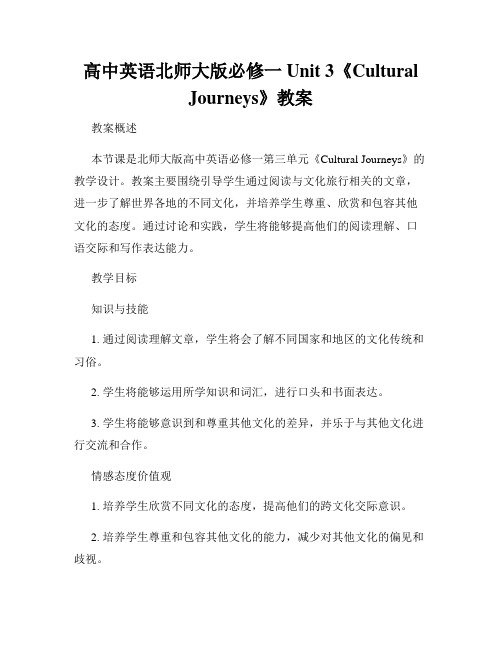
高中英语北师大版必修一 Unit 3《CulturalJourneys》教案教案概述本节课是北师大版高中英语必修一第三单元《Cultural Journeys》的教学设计。
教案主要围绕引导学生通过阅读与文化旅行相关的文章,进一步了解世界各地的不同文化,并培养学生尊重、欣赏和包容其他文化的态度。
通过讨论和实践,学生将能够提高他们的阅读理解、口语交际和写作表达能力。
教学目标知识与技能1. 通过阅读理解文章,学生将会了解不同国家和地区的文化传统和习俗。
2. 学生将能够运用所学知识和词汇,进行口头和书面表达。
3. 学生将能够意识到和尊重其他文化的差异,并乐于与其他文化进行交流和合作。
情感态度价值观1. 培养学生欣赏不同文化的态度,提高他们的跨文化交际意识。
2. 培养学生尊重和包容其他文化的能力,减少对其他文化的偏见和歧视。
教学重点1. 通过阅读文章理解各种不同文化。
2. 提高学生的阅读理解能力和跨文化交际意识。
教学难点1. 培养学生对其他文化的尊重和欣赏态度。
2. 培养学生对其他文化的理解和包容能力。
教学方法1. 合作学习:学生通过小组合作和讨论,共同解决问题并分享彼此的观点。
2. 课堂讲解:教师对重点知识进行讲解和解释,帮助学生更好地理解文章内容。
3. 角色扮演:学生扮演不同的角色,模拟跨文化交流情景,提高他们的口语交际能力。
4. 课外扩展:鼓励学生在课后进行相关题目的整理和扩展阅读,提高他们的自主学习能力。
教学步骤Step 1: 导入新课 (5分钟)1. 向学生介绍本节课的教学目标和内容。
2. 引导学生讨论并分享自己对文化旅行的看法和体验。
3. 引入本节课的主题:“Cultural Journeys”。
Step 2: 阅读理解 (15分钟)1. 学生带着问题阅读文章《Cultural Journeys》,了解不同国家和地区的文化特色。
2. 学生通过小组合作讨论并回答问题,帮助他们理解和消化文章内容。
最新精品北师大高一必修1Unit 3教案4 3 Weddings
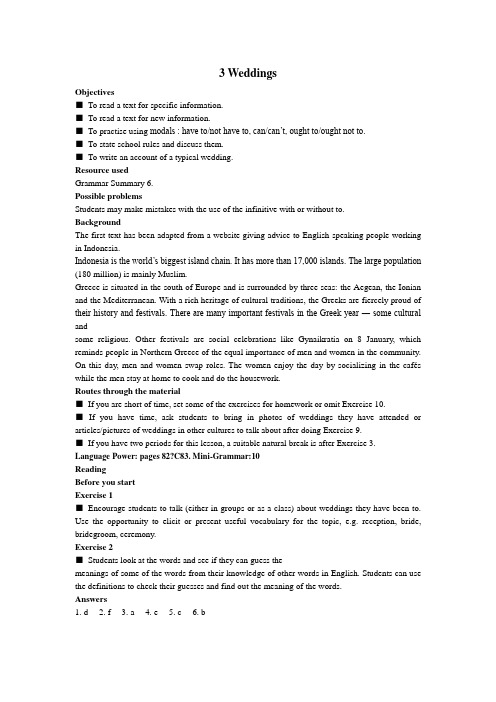
3 WeddingsObjectives■To read a text for specific information.■To read a text for new information.■To practise using modals : have to/not have to, can/can’t, ought to/ought not to.■To state school rules and discuss them.■To write an account of a typical wedding.Resource usedGrammar Summary 6.Possible problemsStudents may make mistakes with the use of the infinitive with or without to.BackgroundThe first text has been adapted from a website giving advice to English-speaking people working in Indonesia.Indonesia is the world’s biggest island chain. It has more than 17,000 islands. The large population (180 million) is mainly Muslim.Greece is situated in the south of Europe and is surrounded by three seas: the Aegean, the Ionian and the Mediterranean. With a rich heritage of cultural traditions, the Greeks are fiercely proud of their history and festivals. There are many important festivals in the Greek year ― some cultural andsome religious. Other festivals are social celebrations like Gynaikratia on 8 January, which reminds people in Northern Greece of the equal importance of men and women in the community. On this day, men and women swap roles. The women enjoy the day by socializing in the cafés while the men stay at home to cook and do the housework.Routes through the material■If you are short of time, set some of the exercises for homework or omit Exercise 10.■If you have time, ask students to bring in photos of weddings they have attended or articles/pictures of weddings in other cultures to talk about after doing Exercise 9.■If you have two periods for this lesson, a suitable natural break is after Exercise 3.Language Power: pages 82?C83. Mini-Grammar:10ReadingBefore you startExercise 1■Encourage students to talk (either in groups or as a class) about weddings they have been to. Use the opportunity to elicit or present useful vocabulary for the topic, e.g. reception, bride, bridegroom, ceremony.Exercise 2■Students look at the words and see if they can guess themeanings of some of the words from their knowledge of other words in English. Students can use the definitions to check their guesses and find out the meaning of the words.Answers1. d2. f3. a4. e5. c6. bRead to learnExercise 3■Ask students if they have tried to find information about customs (not necessarily weddings) in other countries on theInternet ?C if so, what did they find out?■Students read the statements first and predict what theanswers will be.■Then they read the texts and find out if their predictions were correct.■When checking students’answers, ask them to read out the section of text that gives the information and to correct the false statements.■In pairs, students study the text again and write down three “true/false” statements of the ir own. All the students then close their books and, in turn, say one of their statements and the rest of the class says whether it is true or false.Answers1. F2. F3. T4. T5. F6. TGrammarhave to/not have to, can/can’t,ought to/ought not toExercise 4■Students find and underline the words in the texts.Exercise 5■Students match the verbs to their meanings.Answers1. b2. a3. d4. c5. f6. eRefer students to Grammar Summary 6 for further explanation and examples.Exercise 6■Students read the whole text before filling in any of the gaps.■When students have completed the text, they can compareanswers with their partners before checking answers as a class.Answers1. have to2. don’t have to3. can4. ought to5. don’t have to6. can’t7. can 8. ought to9. ought not toVocabulary: Word buildingExercise 7■ Ask students how many word suffixes they know. Do they know the rules of the word formation?■ Students work in pairs to add suffixes to the words.Answers1. invitation2. reception3. attendance4. entrance5. contribution■ Encourage students to find more nouns with the suffixes of “-tion” and “-ance”.Exercise 8■ Students complete the sentences by using the verbs an d nouns in Exercises 7.Answers1. invited, invitation2. attend, Attendance3. entrance, enter4. reception, have received5. contribute, contributionLanguage Power: the Word Corner on page 83 gives further vocabularypractice.Language in UseExercise 9■ First, have a class discussion about the eight topics suggested (clothes, reception, etc.) and elicit or present useful vocabulary (wedding dress, suit, headdress, bouquet, toast, honeymoon).■ Students then select some of the topics and write a short article for an English magazine about “Weddings in my city/town”.Remind students to organise their writing in paragraphs.■ Students can then exchange papers and read each other’s articles. Encourage peer correction of mistakes.Exercise 10■ Each student writes eight sentences giving advice to a foreigner who is going to a wedding in their town/city. Students can use the information they have got in their article in Exercise 9 when making sentences.■ Ask students to work in pairs. Stu dent A and Student B then talk about what to do when attending a wedding with one of them playing the role of the foreigner.OptionsPracticeIn groups, students exchange information about the rules and behaviour expected in any clubs or societies they belong to, e.g. sports groups, drama clubs. In groups, students make a list of rules for an English club at their school.Extension。
高一英语必修1 Unit3教案北师大版

高一英语必修1 Unit3教案(北师大版)2.To build up an area of vocabulary associated with Christmas. Teaching procedure 教学活动 Activities 设计意图 Intentions 互动模式&时间 IP&Time Lead in Step 1 Brainstorm: List the words related to Christmas. [PPT 3] 引出话题,激活学生的背景知识。
CW 2’Pre-reading Step 2 Learning some new words related to Christmas by presenting pictures [PPT 4-7] 引导学生学习话题词汇,扩充词汇库CW 3’While-reading Step 3 Fast reading : find what things about Christmas are mentioned in the passage. Circle the things in the p assage. (Ex. 2) [PPT 8] 快速阅读,在文章中理解和巩固话题词汇IW 3’ Step 4 Detailed reading: 1. Read the text and learn some new words by E nglish meaning and exercises. 1) Match the words with their definitions. (PPT & Hando ut) [PPT 9-12] 2) Choose the correct words and complete the sentences with correct forms. [PPT 13-16] [学案II] 引导学生在文章中学习词汇,并在具体语境中运用IW and IM 8’ Step 5 2. Read the passage again and do Ex. 4 according to the Reading Strategies [PPT 17] 指导学生体会、理解阅读策略,并在阅读中进行实践运用。
高中英语北师大版必修1文档Unit 3 Section Ⅵ Lesson 4 Word版含答案
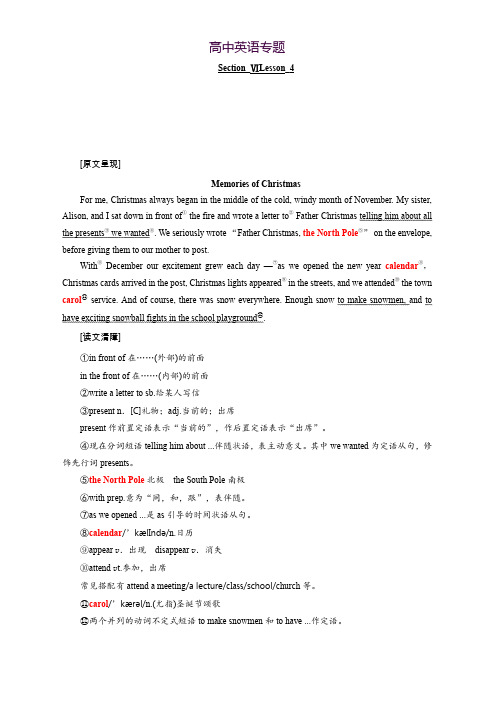
Section_ⅥLesson_4[原文呈现]Memories of ChristmasFor me, Christmas always began in the middle of the cold, windy month of November. My sister, Alison, and I sat down in front of① the fire and wrote a letter to② Father Christmas telling him about all the presents③ we wanted④. We seriously wrote “Father Christmas, the North Pole⑤” on the envelope, before giving them to our mother to post.With⑥December our excitement grew each day —⑦as we opened the new year calendar⑧,Christmas cards arrived in the post, Christmas lights appeared⑨ in the streets, and we attended⑩ the town carol⑪service. And of course, there was snow everywhere. Enough snow to make snowmen, and to have exciting snowball fights in the school playground⑫.[读文清障]①in front of在……(外部)的前面in the front of在……(内部)的前面②write a letter to sb.给某人写信③present n.[C]礼物;adj.当前的;出席present作前置定语表示“当前的”,作后置定语表示“出席”。
北师大版高中英语必修一Unit3-L3-4Weddings Christmas同步基础知识练习(含答案)
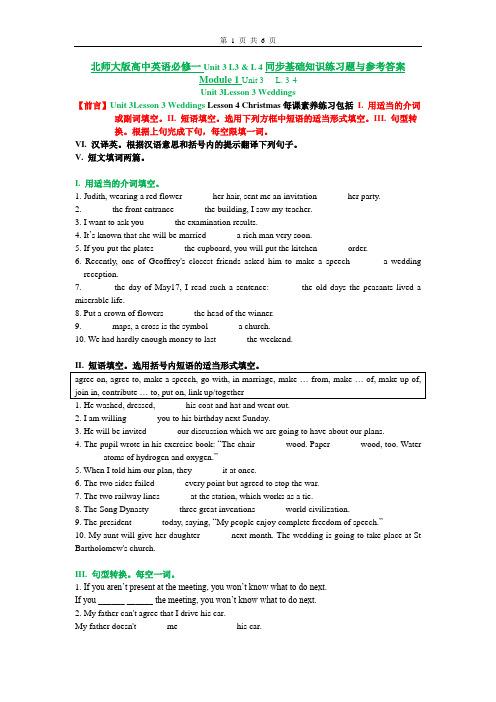
北师大版高中英语必修一Unit 3 L3 & L 4同步基础知识练习题与参考答案Module 1 Unit 3----L. 3-4Unit 3Lesson 3 Weddings【前言】Unit 3Lesson 3 Weddings Lesson 4 Christmas每课素养练习包括I. 用适当的介词或副词填空。
II. 短语填空。
选用下列方框中短语的适当形式填空。
III. 句型转换。
根据上句完成下句,每空限填一词。
VI. 汉译英。
根据汉语意思和括号内的提示翻译下列句子。
V. 短文填词两篇。
I. 用适当的介词填空。
1. Judith, wearing a red flower ______ her hair, sent me an invitation ______ her party.2. ______ the front entrance ______ the building, I saw my teacher.3. I want to ask you ______ the examination results.4. It’s known that she will be married ______ a rich man very soon.5. If you put the plates ______ the cupboard, you will put the kitchen ______ order.6. Recently, one of Geoffrey's closest friends asked him to make a speech ______ a wedding reception.7. ______ the day of May17, I read such a sentence: ______ the old days the peasants lived a miserable life.8. Put a crown of flowers ______ the head of the winner.9. ______ maps, a cross is the symbol ______ a church.10. We had hardly enough money to last ______ the weekend.1. He washed, dressed, ______ his coat and hat and went out.2. I am willing ______ you to his birthday next Sunday.3. He will be invited ______ our discussion which we are going to have about our plans.4. The pupil wrote in his exercise book: “The chair ______ wood. Paper ______ wood, too. Water ______ atoms of hydrogen and oxygen.”5. When I told him our plan, they ______ it at once.6. The two sides failed ______ every point but agreed to stop the war.7. The two railway lines ______ at the station, which works as a tie.8. The Song Dynasty ______ three great inventions ______ world civilization.9. The president ______ today, saying, “My people enjoy complete freedom of speech.”10. My aunt will give her daughter ______ next month. The wedding is going to take place at St Bartholomew's church.III. 句型转换。
- 1、下载文档前请自行甄别文档内容的完整性,平台不提供额外的编辑、内容补充、找答案等附加服务。
- 2、"仅部分预览"的文档,不可在线预览部分如存在完整性等问题,可反馈申请退款(可完整预览的文档不适用该条件!)。
- 3、如文档侵犯您的权益,请联系客服反馈,我们会尽快为您处理(人工客服工作时间:9:00-18:30)。
Ⅰ.单词拼写1.mess n.混乱,脏乱2.worship v t. 敬神,拜神3.invade v t. 侵略4.fry v t.用油煎,用油炸→fried adj.油煎的5.unfortunately ad v.不幸地→fortunately ad v.幸运地6.production n.生产,制造→produce v.生产7.adopt v.收养,领养;采用→adoption n.收养8.honour n.光荣;敬重v.表扬;尊重→honourable adj.可敬的9.immigrant n.移民→immigrate v.移居Ⅱ.补全短语1.as well也2.put out熄灭;关掉;生产3.go on(情况、形势)继续下去,持续4.complain about 抱怨5.a bit of一点儿……;有一些……6.dress up盛装;打扮7.frighten sb./sth. away把……吓走8.in particular 特别地9.a variety of各式各样的;种种10.be supposed to do sth. 理应/应该做某事1.I met a Mongolian window cleaner called Samantha.我遇到了一位叫Samantha的蒙古籍窗户清洁工。
[句式分析]called Samantha 为过去分词短语作定语,修饰cleaner。
[佳句赏析]《六尺巷》这首歌现在很流行。
The song called SixFeetLane is very popular.2.It was believed that any village that did not give food would have bad luck.人们认为哪一个村子不献出食物就会有坏运气。
[句式分析]It is/was believed that ...为固定结构,意思是“人们相信……”,it 为形式主语,that 引导主语从句。
that did not give food 为定语从句,修饰先行词village。
[佳句赏析]人们认为马航370被人劫持了。
It is believed that Flight MH370 was robbed.3.It's usually the biggest family gathering for most families, so everyone is supposed to go home to join the celebration.这是大部分家庭最大的家庭聚会,因此每个人都应该回家去参加庆祝。
[句式分析]be supposed to do sth. “应该做某事”;to join the celebration为不定式短语作目的状语。
[佳句赏析]你应该相信自己。
You are supposed to believe in yourself.[教材原句]A few of my good friends came as well.我的几个朋友也来了。
as well as(除……之外)也,既……又……may/might as well 不妨,倒不如,还是……的好He writes his own songs and plays the guitar as well.他自己写歌,也弹吉他。
You believe him, as well as me.你相信他的话,也相信我的话。
Email, as well as telephone, is(be) playing an important part in daily communication.电子邮件以及电话在人们的日常交流方面起着重要作用。
It's so cold outside, we might as well stay at home.外面太冷,我们不如待在家里好了。
[辨析比较]as well 用在肯定句中,放在句末1.选词填空:as well as, as well, also, too, either①We went to the zoo. We visited the museum as_well.②He's worked in Japan as_well_as Italy.③My son is also a football fan though he is only six.④John doesn't like pop music, either.⑤When I've finished the bathroom, I'm going to paint the kitchen, too.2.完成句子⑥你最好还是马上离开,因为校长不许学生们进来。
You might_as_well leave at once, for the headmaster prohibited students from coming in.⑦我要去伦敦,我的妹妹也要去。
I'm going to London and my sister's going to Londonas_well.⑧除了在公司上班外,她还花了大量时间学习法律。
As_well_as_working in the firm, she spends a lot of time studying law.[教材原句]Later, when the Romans invaded Europe, they adopted the Celts' New Year customs and used them in their own festivals.后来,当罗马人侵略欧洲的时候,他们采用了凯尔特人的新年习俗,并把这些习俗融入他们自己的节日中。
(1)adoption n.采纳;收养adopted adj. 被收养的(2)adapt v t. 适应;改编adapt (oneself) to (doing) sth.(使自己)适应(做)某事be adapted from sth. 由……改编Different methods can be adopted to solve a problem.解决一个问题可以采用不同的方法。
Having no children of their own, they decided to adopt an orphan.他们因没有亲生儿女,所以决定领养一个孤儿。
The adopted girl soon adapted to her new family.这个被收养的女孩很快适应了她的新家庭。
The TV series is adapted from a true story.这部电视剧是由一个真实故事改编的。
1.选词填空:adopt, adapt①The couple would like to adopt a baby.②Children are well adapted to their surroundings.③The policies can be adapted to suit individual needs and requirements.2.单句语法填空④The play is adapted froma novel.⑤They adopted her astheir own daughter.⑥You'll adapt yourself to your new school life as soon as possible.[教材原句]Today, in the USA and the UK in particular, Halloween has become a special occasion for young people.今天,尤其在美国和英国,万圣节已成为年轻人的一个特殊节日。
be particular about/over ...对……很挑剔/过于讲究particularly ad v. 特别;尤其The whole meal was good but the wine in particular was excellent.整顿饭都很好,但葡萄酒尤其好。
Be particularly careful when driving at night.晚上开车要特别小心。
The lady is very particular about her clothes.这位女士对衣服过于讲究。
1.单句语法填空①The restaurant is particularly(particular) popular with young people.②I came here specially(special) to see you.2.完成句子③你吃东西不应挑剔。
You should not be_particular_about what you eat.④我喜欢水果,尤其是苹果。
[教材原句]The house was a bit of a mess ...房子有点乱……in a mess乱成一团;陷入困境get into a mess 陷入困境make a mess of 把……弄糟mess up 搅乱,打乱Oh, my god! Your room is a real mess!天啊,你的房间太乱了!The previous chairman left the company in a terrible mess.前董事长把公司搞得一团糟。
The local economy is now getting into a mess.当地的经济现在正陷入困境之中。
Who messed up my papers?谁把我的文件搞得乱七八糟?1.单句语法填空①How did his clothes get into a mess?②The kitchen's always so messy (mess) after we've had guests.③She felt she'd messed(mess) up her whole life.2.完成句子④Everything on his bed is out of order. What_a_mess(多么乱啊)!⑤The industry came finally to get_into_a_mess (陷入困境) for lack of money.⑥The children messed_up/made_a_mess_of(打乱) everything in the room.⑦Political situations in Middle Eastern Countries now are in_a_mess(乱成一团).It's usually the biggest family gathering for most families, so everyone is_supposed_to_go home to join the celebration.这是大部分家庭最大的家庭聚会,因此每个人都应该回家去参加庆祝。
